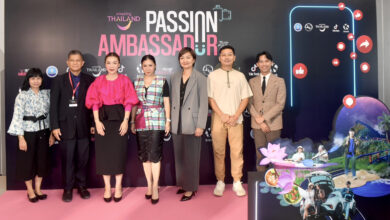Bangkok, 10 December, 2018 – Embarking upon a quality over quantity approach to future development, the Ministry of Tourism and Sports has initiated a number of measures to better balance, manage, and distribute visitor numbers and preserve the quality of tourism destinations.
Minister of Tourism and Sports H.E. Weerasak Kowsurat said, “For many years, we have focussed on the quantity of tourists. It is now time to shift to quality. This does not mean seeing tourism as a “golden goose” for the economy but rather as a means of reducing social disparities and upgrading the quality of life for the Thai people.”
In a broad-ranging statement, the Minister noted that Thailand is known as the Land of Smiles. “We are now getting 35 million tourists a year, which is half our population. If these numbers are not better balanced, managed and distributed, neither the guests nor hosts will be smiling.”
He noted that transportation improvements were under way nationwide with improved connectivity between the hub and secondary airports and a dual-track railway, which is scheduled to be completed in five years.
The Minister noted that it was important to understand what motivates visitors to choose Thailand. Although nearly all markets are growing, but customer requirements are changing, depending on demographics, time availability and budgets.
“However, what they all want is a good experience, meeting Thai people, visiting local communities and eating Thai food,” he said.
The Minister noted that the top priority is safety and security.
A number of measures have been taken to ensure the safety and security of visitors in the aftermath of the July 2018 boat accident in Phuket. In order to recoup the number of Chinese visitors, the Ministry has advocated fixing the underlying problem and communicating it strongly to the Chinese market. This means first restoring the confidence of the Chinese tourists.
The second priority is environmental protection, Minister Weerasak said.
This is the first year that the Thai government and Thai tourism private sector are working together in three areas:
- Ban all smoking on public beaches.
- No more plastic bags or foam containers to be allowed in national parks, both on land and sea.
- Tourists are encouraged to use “Pintos” (food containers) while travelling in national parks.
He said the 55 secondary destinations being promoted nationwide have also been divided into different categories; such as, those which receive more than 6 million tourists and less than 6 million tourists.
The Minister added, “This is the first year that we have set limits on tourists visiting some islands. We are also highly grateful to teams of volunteers who are assisting with beach cleaning operations.”
He urged tourism investors and businesspeople to “listen to the sound of nature before thinking of money. As long as you can hear the sound of nature, that is enough. We must have the courage to decide when to stop trying to bring in more numbers.”
The third priority is facilitation and connectivity, especially to the secondary cities.
To attract Chinese visitors back to Thailand, the visa fees have been waived for the period of 15 November, 2018, to 15 January, 2019.
Some laws also need to be amended, he said. For example, a travel insurance fee could be included in the visa fee. If an accident occurs, insurance should cover the medical expenses. At present, this is covered by Thai taxpayers, which should not be the case.
Various categories of insurance premiums can be created to cover everything from regular driving to risky activities; such as, diving, climbing and rafting.
He added, “I am also seeking Cabinet Resolutions to change some visa regulations. For example, citizens of 38 countries can visit Thailand several times without visas. But if they arrive overland, they can enter only twice a year. Many foreigners live in neighbouring countries close to the Thai border. Therefore, we should have a visa category to accommodate them, similar to those arriving by air.”
“Travellers who do not require a visa to enter Thailand by air, should also be able to similarly enter Thailand by land.
“Tourists traveling to the border checkpoints close to the 55 secondary cities come with a single entry visa. I have asked the Cabinet to approve a multiple-entry visa for border-crossings as well as a double-entry visa category with a six-month validity.
“A double entry visa will provide a convenient way for visitors to come for medical treatment, enroll for Thai cooking classes, attend international conferences, or enjoy sporting activities. I have proposed that the visa fee remain unchanged at 1,000 Baht.
*Featured image: A U-shaped skywalk at Pha Tak Suea Temple, Nong Khai, one of the 55 secondary cities.






